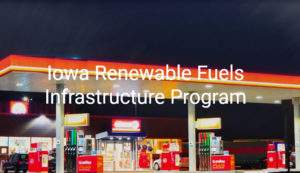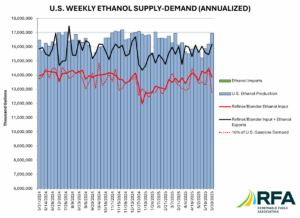
ACE CEO Brian Jennings at 2024 FEW (BBI Photos)
(ACE) CEO Brian Jennings will moderate a panel at next week’s
2025 Fuel Ethanol Workshop (FEW) spotlighting how agricultural conservation practices can create new markets and profit opportunities for ethanol producers and farmers.
Titled “Turning Agricultural Practices into Low-Carbon Farming Success,” the panel will explore how the ACE-led Regional Conservation Partnership Program (RCPP) projects are helping farmers adopt soil health practices such as reduced tillage, efficient fertilizer use, and cover crops—to generate localized, verifiable data that supports greenhouse gas (GHG) reduction measurements that can lead to access to lucrative carbon markets.
Panelists include:
Brennan Lewis, Research Associate, Agronomy and Plant Science, South Dakota State University, who will provide a progress update and share insights from field-level data and grower engagement.
Brent Hoops, Commodities Director at Chief Ethanol Fuels, Inc., who will offer a perspective from the ethanol production side and describe how this work aligns with facility and farmer interests.
Dr. Richard Ferguson, Professor of Soil Science at the University of Nebraska-Lincoln, who will discuss soil health, carbon benefits, and productivity impacts of conservation practices.
Jennings says ACE is working alongside farmers, ethanol companies, university soil scientists, and U.S. Department of Energy carbon modelers to scientifically document the carbon value of conservation practices across different soil types, temperatures, and precipitation levels across the corn belt.
“We’re helping bridge the gap between conservation practices on the farm and clean fuel markets that reward those efforts,” said Jennings. “That means more value for farmers and ethanol producers, and real progress toward improving modeling tools and unlocking market opportunities which can create new demand and value for corn ethanol.”
The session will take place on Monday, June 9, from 1:00 to 2:30 p.m. in Room 213/214 at the CHI Health Center in Omaha. Jennings will also participate in the Association Executives Q&A during the FEW general session on Tuesday morning, and ACE staff will be at booth #501 during the event, June 9-11.
 The Iowa Renewable Fuels Infrastructure Program (RFIP) last week awarded $1 million in cost-share grants to support the installation of E15 at 91 additional retail fuel sites across Iowa. This milestone brings the total number of E15 projects awarded this fiscal year to a record 388, by far the most grants in a year since RFIP’s inception.
The Iowa Renewable Fuels Infrastructure Program (RFIP) last week awarded $1 million in cost-share grants to support the installation of E15 at 91 additional retail fuel sites across Iowa. This milestone brings the total number of E15 projects awarded this fiscal year to a record 388, by far the most grants in a year since RFIP’s inception.









